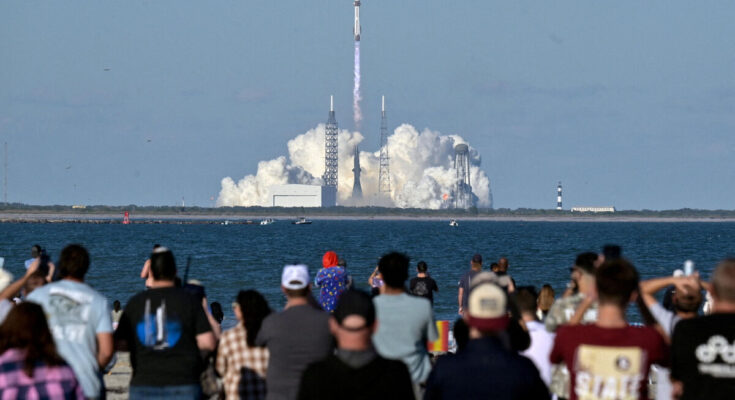Blue Origin, the company of Amazon founder Jeff Bezos, on Thursday successfully recovered propellant from its powerful New Glenn rocket after launch, a major step forward for the American company looking to compete with Elon Musk’s SpaceX. “This is a historic day for Blue Origin,” said Blue Origin vice president Ariane Cornell in a video broadcast.
After the rocket lifted off from Cape Canaveral in Florida, the company successfully landed the first stage, or booster, in a controlled manner on a barge at sea, to loud applause and screams of joy from its employees. The maneuver, which is extremely complex for a rocket of this size, has only been attempted for the second time by the company, and until now has only been successfully carried out by its big rival, SpaceX.
“Damn, that was great!” », quickly greeted X Jared Isaacman, a close friend of Elon Musk who Donald Trump would like to see become the head of NASA. Some SpaceX employees even greeted rivals, such as Jon Edwards, Falcon’s rocket launch chief. “Recovering an orbital rocket is very difficult. Well done!”, he wrote in X, assuring that Americans could be “proud.”
With this success, Jeff Bezos, who wants to catch up with Elon Musk, should succeed in speeding up his launch rate and reducing his costs. The two multi-billionaires each founded their space companies in the early 2000s, but Blue Origin grew much more slowly than SpaceX, which now dominates the sector, in part because of a more cautious technical approach.
With this successful second orbital flight, Jeff Bezos aims to show that he is a serious competitor, especially in the context of increasing competition around NASA’s Artemis lunar program. The American space agency, which plans to send Americans back to the Moon in the next few years, in October raised the possibility of doing so without the sector’s flagship company, SpaceX, due to development delays.
Bezos–Musk rivalry
The news has angered Tesla bosses and could benefit Jeff Bezos, who is also developing a lunar lander for NASA, now being planned for his next mission.
In this context, the performance of the New Glenn rocket, which on Thursday carried a NASA science mission called Escapade intended to study Mars, received special attention. If Jeff Bezos’ company “carries out this mission, it will give confidence to NASA,” George Nield, president of a company that promotes private space activities, said ahead of the launch.
Since Donald Trump’s return to the White House, the American government has put enormous pressure on NASA to speed up its lunar program, which has experienced many complications and delays in recent years.
Sean Duffy, NASA’s acting administrator, even went so far as to call for a “second space race” between Washington and Beijing, also aiming to set foot on lunar soil by 2030, after the United States and Soviet Union became involved during the Cold War.
Through the Artemis program, America seeks to establish a lasting human presence on the Moon and prepare the groundwork for future missions to Mars. The spacecraft launched Thursday on behalf of NASA should play a role in this project, by deepening knowledge about the red planet.
Named Blue and Gold, the latter will position themselves in a “safe parking” orbit to stay close to Earth and wait for the ideal moment to depart for Mars, which they will reach in 2027, Joseph Westlake, a NASA official, explained on Thursday.



